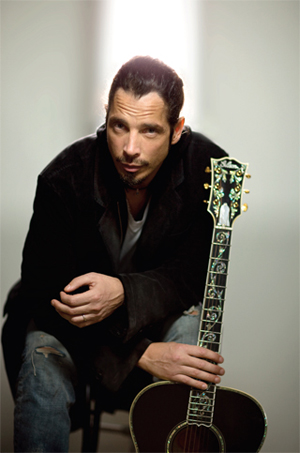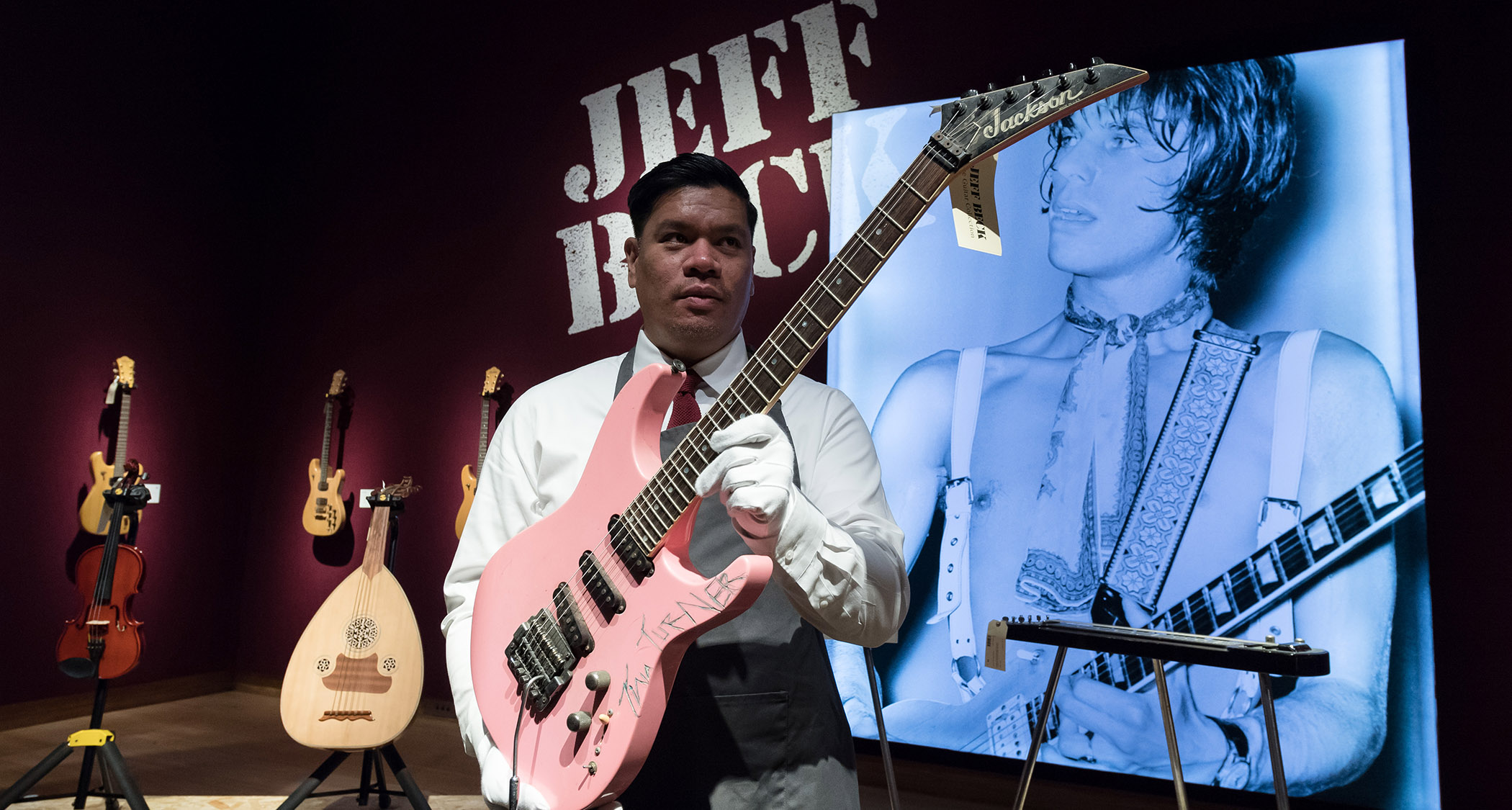Chris Cornell: Alive in the Super Unknown

Originally published in Guitar World, August 2009
Former Soundgarden/Audioslave frontman Chris Cornell scraps his familiar musical style and enjoys an artistic rebirth with Scream, his new Timbaland-produced disc.
Chris Cornell sits in the Guitar World offices, draping his lanky frame on a chair he obviously finds uncomfortable, and ponders the position he’s in—musically, that is.
His new album is called Scream, and belying the title, it’s something he’s doing little of. He’s deep-sixed his trademark paint-peeling vocal wail and is “for once, actually singing,” he says. “I haven’t done a lot of it during my career, and I have to say, it feels pretty good.”
Along with his ferocious vocal style, Cornell has ditched the raging guitar tunes of his past on Scream, an au courant collaboration with noted hip-hop producer Timbaland. (The album’s cover couldn’t be less subtle or symbolic, featuring Cornell in midair, ready to demolish a guitar in a way not seen since the days of Kurt Cobain.) So far, the vast amount of synths, loops and dance beats that make up the album’s musical bed have not connected with fans, and the former Soundgarden/Audioslave frontman finds the situation both perplexing and to be expected.
“Any time you take a left turn as an artist, it’s bound to throw people a bit,” Cornell notes. “Still, I would hope that everybody can get past what I’m not doing on the record and listen to what I am doing. I’m alive on this record! There’s just as much heart in these songs as in anything I’ve ever done.
“See, I’ve already done ‘Black Hole Sun.’ I already did ‘Rusty Cage.’ I don’t need to do them again. The second you start writing to please people, you may as well be a short-order cook. That’s not me.”
All the latest guitar news, interviews, lessons, reviews, deals and more, direct to your inbox!
GUITAR WORLD You seem to be of two minds about Scream: you understand why your fans don’t “get” it, but it’s troubling to you, too.
CHRIS CORNELL Well, sure. It is troubling to me, but yes, I did anticipate it. I understand why people are surprised at the sound—“Where’s the heavy rock?” “Where’s the big guitars?” But I couldn’t let that be my overriding thought when making the album. In fact, going into it, I pretty much knew that a big portion of my audience might not appreciate it.
GW I know you have to do what you need to do as an artist. Still, there’s art and there’s commerce.
CORNELL I know the math involved, but the minute you think about the commerce side of things, you’re dead. I can think about commerce when touring—there’s budgets for everything on a tour. When making an album, though, it has to start with an album. I can’t make a record trying to please people. I know this sounds like a patented artist response, but I have to please myself.
I think that’s the danger sometimes. People associate me so much with heavy, aggressive guitar music—Soundgarden, Audioslave—that the second I do something else they overreact. “What’s he doing?” “He’s gone soft.” “He can’t do that! That sounds like pop music.” You don’t know how stifling being pigeonholed is until it actually happens to you.
GW I think what’s throwing people is that this is such a radical split from what you’ve done in the past. It’s almost as if Metallica did a folk album.
CORNELL [laughs] You know, if they wanted to do a folk album, I’m sure I’d want to hear it.
GW What made you decide to work with Timbaland?
CORNELL During our discussions we met pretty close in the middle: he wanted to do something that rocked more, and I wanted to do something with more electronics and loops. Plus, I liked not knowing how it would turn out. I’ve made a lot of records where I knew how they would sound before we even went in the studio. I’m not saying they’re bad records, but I can’t say I felt the same amount of danger as I did with this one. Danger’s a good thing for an artist.
GW You like that feeling—“danger.”
CORNELL Sure. If you don’t feel that as an artist, then I don’t know what you’re doing. Just being a homogenized sellout, I guess.
Look, I’m well aware of the flak I’m getting for this record, and I’m okay with it. When you look back at so many records that are now considered classic or great or whatever, it took time for them to find their place. I fully admit that Scream might be ahead of its time. Maybe people will appreciate it in five or 10 years.
I made the record I wanted to make. I didn’t make it to be of its time [or] to work with what’s happening now; I made it because it’s what I felt, what I heard. So people might tune into it a year from now or three years from now. I’m absolutely okay with that.
GW What types of guitars are you gravitating toward these days?
CORNELL I play acoustics a lot. I like smaller-body models—I guess you’d call them concertsized guitars. I have a Martin that’s fantastic. I don’t know the model number or anything, but it’s a fantastic guitar. It feels right against my body; it feels good in my hands. More than that, it gives something back to me. I play it and it gives me songs. It’s a great guitar for story telling. If you can find a guitar like that, you know you’ve picked the right one.
You know how it is: you can go to Guitar Center or wherever, they can have 25 guitars of the same make and model, but you can pick out one of them and that’s the one. It’s not like buying a car. A guitar is a living, breathing thing. Each one is special, which means one can be better than the other. That’s why you should spend a bunch of time in a guitar store. Don’t just pick one up and buy it. The one right next to it might be the keeper.
GW Are you still playing Telecasters? I remember you really gravitated toward them in your Soundgarden days.
CORNELL Oh, I love Teles. I wasn’t using them at first in that band. I started out playing Les Paul Customs; they sounded big and aggressive and sustainy, but not in a heavy metal way. After a while, though, my tastes started changing, and I found that Telecasters gave me this almost Sixties garage rock sound that I really liked. Actually, it was a progression of guitars: I started out with the Les Pauls, then switched to Gretsch Duo Jets, then Jazzmasters, and it was the Jazzmasters that led me to the Telecasters. I found that Teles were very consistent and reliable, no matter what song or tuning we were using.
GW Were Teles a way to sound different from [Soundgarden guitarist] Kim Thayil? He played the Guild S1s a lot.
CORNELL Yeah, he loved using the Guilds. I guess it was a way not to clash with his sound. We were trying to give our records these sonic beds of guitar sounds. If you hear the same guitar sound throughout an entire album, it gets boring.
GW You were first known as a lead singer in the Robert Plant mode, the guy standing at the mic bare chested—the whole rock-god thing.
CORNELL Yeah, I ran from that as fast as I could. As soon as people started seeing me in that light, I pulled back.
GW Is that why you started playing guitar so much? I remember on the Superunknown tour, you were playing guitar live pretty much the whole time.
CORNELL It was partly for that but also because our songs at that point wouldn’t work with just one guitar when we played live.
It’s funny: I pretty much learned guitar from being around Kim. He didn’t sit down and actually show me how to play; I kind of soaked it up like a sponge. His whole approach—gritty yet psychedelic—I dialed right into that. He was very influential. He was encouraging, too. He never felt threatened when I picked up a guitar. Anything I played, if it was good, he was thrilled. Kim taught me an incredible amount about music just by being in the same room with me. The whole band influenced me: Ben [Shepherd, bass] and Matt [Cameron, drums] were very important in shaping me musically.
GW Sounds like you have a lot of fond memories of those days.
CORNELL Absolutely. For some reason, there seems to be this belief going around that we had a bad breakup, which is totally untrue. There was never any bad blood between us. In fact, I spoke with Kim just recently. We’ve always been good friends.
GW How about [Audioslave guitarist] Tom Morello? What did you learn from him as a guitarist? Obviously, his style is miles apart from Kim’s.
CORNELL I don’t know if I learned anything. He’s a tremendous guitar player, obviously, but I think by the time I hooked up with Tom, my own style of playing was formed. Tom reminds me of a low-tech version of the Edge. From what I’ve heard, the Edge is very high-tech with his effects and his pedal boards, whereas with Tom, everything on the floor has a nine-volt battery in it.
GW So what actually happened with you and Audioslave? When I interviewed Tom several years ago, right as you were putting out Revelations, he seemed mystified as to what was happening with the band. He said he hadn’t heard from you…
CORNELL A lot of things happened there, a lot of your usual dysfunctional band things. And a lot of times, it had nothing to do with me. There were a lot of disagreements on how to run things in that band. Musically, for me, the group pretty much had run its course. I think we ended on a high note, though. Revelations is my favorite album of ours.
GW Are you on good terms with Tom?
CORNELL Sure. He’s great. I’d definitely say we’re still friends.
GW What did you think about seeing Tom on YouTube playing in Seattle with three-fourths of a reunited Soundgarden? [Tad Doyle from the band Tad sang lead vocals.]
CORNELL I thought it was terrific! It gave me a warm feeling. I wish I could have been there. I would have jumped onstage in a second.
GW There seems to be something in the air, almost as if people are starting to call out for a Soundgarden reunion.
CORNELL It could happen. I’m never going to count anything out. I’m doing things now that I never thought I would be, so I would never rule out getting back together with those guys.
GW I’m sure you don’t want to talk about your divorce…
CORNELL [laughs] No, I surely don’t.
GW But recently, you got back a bunch of your guitars—14 of them, I think—from your ex-wife. What was the story there?
CORNELL You’re just as likely to find an explanation for that as I am. Suddenly I find myself being sued for my own guitars. [laughs] I don’t know. But I finally got them back, and it was great, like being reunited with old friends.
